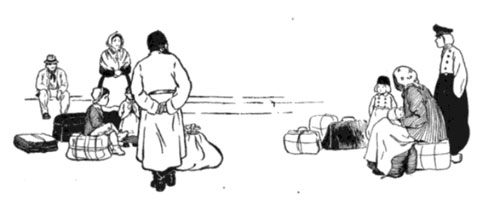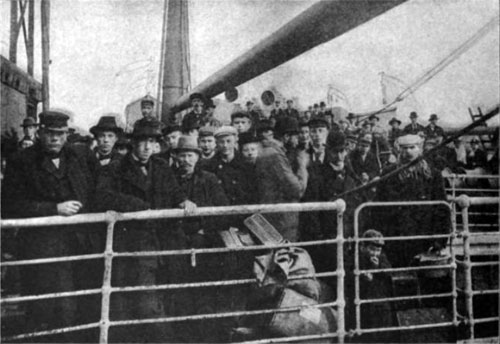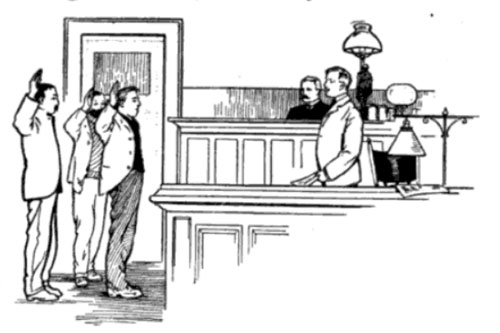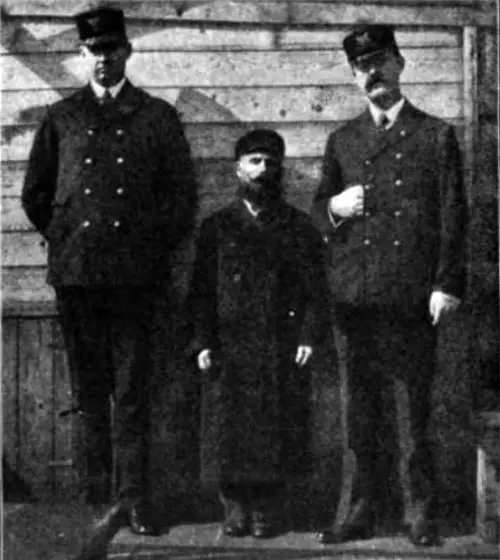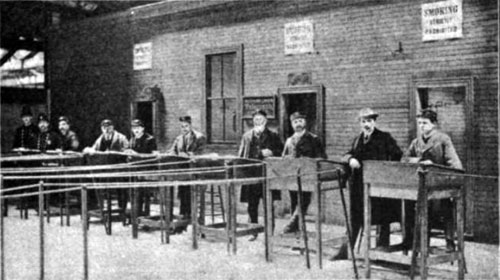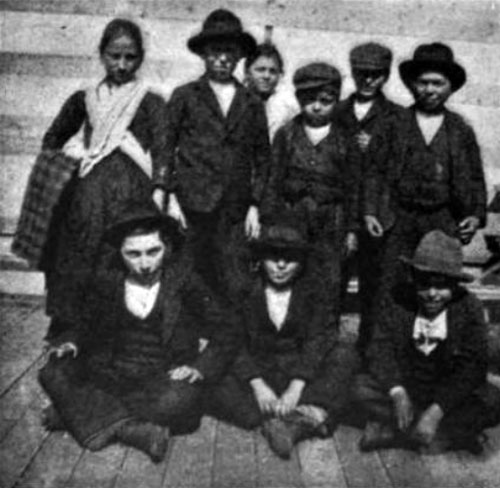Immigration And Naturalization Story for Children
Intended for a Younger Audience
AN IMMIGRATION AND NATURALIZATION STORY
SABRINA COHENSKY was standing by one of the window boxes of the schoolroom. Jonquils were in full bloom, although it was only February. Sabrina was poking into the soil with a pencil, gently loosening the earth.
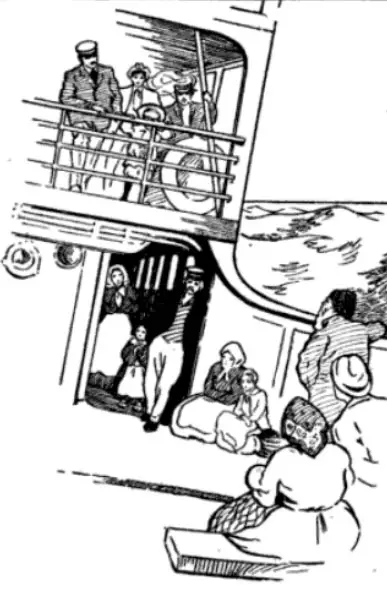
Fig 02 - The Journey Begins In Steerage
" It makes them grow better," she said to a little girl standing near her. " It gives them more chance."
One of the more petite girls suggested, " Perhaps the teacher will not like to have you do it." " Oh, yes, she will," Sabrina answered. " She has given me my chance."
" How ? " asked the little girl.
" Yes, she's helped me grow," Sabrina went on. "When I came here five years ago, I was a little Russian girl and could not speak English. Now I am a citizen of the United States, and I can say anything in your language."
" Oh! Oh! Oh !" came from the astonished children, and then one girl spoke out, " But you're not a citizen, and, besides, you never will be because you're a girl."
" Oh, yes, I am !" Sabrina replied quickly. " I am an American citizen. Father said so last night."
Sabrina Cohensky had just been promoted into Miss McEvoy's room. Miss McEvoy was the principal of the Allen School. From the morning when Sabrina, at eight years of age, had taken her seat in the first primary grade to the present hour, this teacher had kept watch of the little Russian, making sure that the bright child should be promoted as fast as possible from one grade to the next so that she might get alongside with the other pupils of her age as soon as she had mastered the new language. Little Sabrina worked hard, learned quickly, and now with the mid-year promotions, though but thirteen years of age had reached the last grade in Miss McEvoy's building.
Just as the children were disputing Sabrina's citizenship, Miss McEvoy herself joined them at the window. She had heard Mary Green say, " You can't be a citizen because you are a girl."
" Yes, Sabrina is a citizen of the United States." Miss McEvoy placed her hand on the little girl's shoulder. "And if you come to my desk, I will read you something that will make you see that you and she and all of us are citizens."
The children gathered around Miss McEvoy, and she opened a book which read as follows:
"Citizenship is recognized local membership in a political community. Citizenship is a privilege that attaches to men and women and children, down to the very youngest; convicts, paupers, insane persons, maybe and usually are citizens and are entitled to care and protection of the state. By the statute of 1885, every woman married to a citizen of the United States has been deemed a citizen. Citizens may or may not be voters; only about one-fifth of them have the right of suffrage."
" There! there I," shouted Sabrina. " You see, I am! I am a citizen of the United States !"
Photo 01 - Immigrants On Deck - Just Before Landing In The United States
" I wonder how many of you children are foreign-born? " Miss McEvoy asked, noting the exciting expressions on the faces of the children. Half a dozen hands went up, and then she asked, " And how many of you have foreign-born parents? "
Every hand in the room was raised, for the Allen School was in the heart of a big city, where the foreign population had crowded out the older, native-born families of an earlier generation. Many of the children were Italians, with here and there an Armenian or a Hungarian. But Sabrina was the only Russian in the room.
Because the children seemed interested in citizenship at just this moment, Miss McEvoy told them she would give up the spelling lesson after the recess was over and tell them more of " immigration " and why so many of their parents and friends had longed to come to our country.
And this is what she told them :
" Over there, in such countries as Italy and Russia and Austria-Hungary, there are few well-to-do farms like those of America. Most of the land is cultivated by peasants, that is, a class of tillers of the soil, often impoverished, who can do nothing to better their children's condition in the future.
They find it very hard to meet the heavy rents or taxes, for you see, most peasants have no right to the soil. They live on great estates owned by wealthy men, who parceled the land to them and demanded rents.
They have heard that there is a better chance in America, and the people of a village often raise money as a fund to be given' to enterprising young men and women, so that they may travel across the continent of Europe and the Atlantic ocean, to come to this free country of ours.
After a little while, a man may not only support himself at good wages, but he may save money and buy a little farm, and still later may become a voting citizen of the United States."
Up went Sabrina's hand. " When my father came to this country, he walked from Moscow to Hanover seven years ago to save the little money his friends had collected for him.
It took father three years to prepare to come to America, but only two years after he got here to lay up enough money to send for mother and hide brother and me. The United States is a beautiful country, my father thinks."
"Why, Sabrina," Miss McEvoy asked, "do you mean that your fattier had to walk all that distance?"
" Yes, but there were Russians in almost every town. He did not walk as a beggar. He had friends to help him, and in every town he passed, other Russians were getting ready to go; when he sailed, there were seven hundred Russians in the steerage coming to this country."
" When you and your mother came, Sabrina, were you afraid ? " asked one of the little girls who had never had to cross the Atlantic.
" I was not afraid," answered Sabrina, " but the ship was filthy, and the air so bad that we could not stay downstairs in the cabin; yet the deck was so wet that here, after a little while, a man may not only support himself at good wages, but he may save money and buy a little farm, and still later may become a voting citizen of the United States."
Fig 03 - Swearing-In To Become US Citizens
Up went Sabrina's hand. " When my father came to this country, he walked from Moscow to Hanover seven years ago to save the little money his friends had collected for him.
It took father three years to prepare to come to America, but only two years after he got here to lay up enough money to send for mother and hide brother and me. The United States is a beautiful country, my father thinks."
"Why, Sabrina," Miss McEvoy asked, "do you mean that your fattier had to walk all that distance?"
Photo 09 - An Immigrant Standing With Ellis Island Inspectors
" Yes, but there were Russians in almost every town. He did not walk as a beggar. He had friends to help him, and in every town he passed, other Russians were getting ready to go; when he sailed, there were seven hundred Russians in the steerage coming to this country."
" When you and your mother came, Sabrina, were you afraid ? " asked one of the little girls who had never had to cross the Atlantic.
" I was not afraid," answered Sabrina, " but the ship was filthy, and the air so bad that we could not stay downstairs in the cabin; yet the deck was so wet that we were chilled and sick if we stayed upstairs.
When I am old enough, I will write articles and stir up the people to make better steerage rooms for the poor people. We never had water to drink all day long unless we stood by the faucet of the tank where the officers drank, and now and then, a good-natured officer would fill my little tin cup for me.
The steerage trip is very horrid, but it is worth all the sickness and sorrow to get to a lovely country and have such dear teachers." The warm-hearted little Russian girl put her hand into that of Miss McEvoy, who stood by her desk.
" I can remember," Sabrina went on, with glowing eyes and unconscious gladness in her story, " just how happy the passengers were when we sighted land and saw the Goddess .of Liberty in New York harbor.
Almost all the steerage passengers managed to get a little water to wash their faces, and some of them had stored away in their packs bright scarfs, which they took out and put around their heads.
When we saw that great statue, one man began to sing, and others joined in the song. Finally, the whole deck resounded to the sound of happy voices. They were trying to sing America in strange tongues; even the music you would not have recognized, Miss McEvoy." I shall never forget it.
" Have you any idea," Miss McEvoy asked the children, " how many immigrants arrive in a week at Ellis Island in New York? "
Of course, the children did not know, so she told them that in some weeks from eight to ten thousand foreigners arrive by steerage, Italy, Austria-Hungary, and Russia are the three most significant sources of immigration.
JUST BEFORE LANDING IN THE UNITED STATES
" Just think !" she went on; "last year, over eight hundred thousand immigrants came to the United States. Of course, you can see that what to do with all these foreign-speaking men and women and little children is a fundamental question.
When they reach our ports, they do not know how to ask for the simplest things, and most of them have little money. Sometimes they have friends waiting for them, or letters to friends in various towns and cities where they hope to go and find work."
THE INSPECTORS WHO MEET THE IMMIGRANTS
One of the boys in the room, who was older than the others and who had lived in New York City, raised his hand and said: " My father used to work for the Society for the Protection of Italian Immigrants. He was an interpreter. That is a great society, Miss McEvoy."
" What does it do? " asked Sabrina.
Somehow, the children had forgotten all about school discipline, and as Carlo Spiero spoke, they all turned in their seats to listen to his story.
Photo 02 - The Inspectors Who Meet The Immigrants At Ellis Island
" Why that society does lots of things," answered Carlo. "First of all, they station men at the piers to prevent boarding-house runners from urging the ignorant immigrants to go with them. Then they have to look out for 'crooks,' who would exchange the peasant's farm money for useless 'confederate ' money, as it is called.
JUST ARRIVED
And society also tries to prevent the district political boss from getting hold of the immigrant on the spot to secure his vote. The interpreters, like the father, find out if the immigrants have any friends to whom they wish to go, or whether they care for any particular kind of work, and later they try to teach them the rights and duties of government in the United States.
They put identification tags upon them and take them from Ellis Island to the Battery Landing in New York. Then regular guards in uniform take them up to Pearl Street, where the society has its headquarters."
Miss McEvoy asked Carlo where the society found the most work to do, and he replied: " It is down at Battery Landing that the runners and the crooks find a large number of these Italians.
Father said that once, despite the city police force on guard, out of thirty immigrants in the care of the society's agents, only fifteen arrived at Pearl Street.
Photo 03 - A Group Of Immigrants Who Just Arrived At Ellis Island
What became of the others nobody knows, but there was a free fight, and the Italians drew their knives on the police and the agents and the crooks themselves."
LITTLE FRIENDS FROM EUROPE
"Yes," Miss McEvoy continued, " Carlo is right. The society of which he speaks is doing noble work. There are other societies—the societies for the Finnish people, for the Irish, for the Jews, and so on; and the government and these associations together are doing their best, and doing it promptly, to place these immigrants out in the country on farms, away from the temptations of the city, and where they will be able to use theirs. great physical strength in tilling the soil."
That evening, when Sabrina Cohensky was at home, she told her father about their conversation in the school during the morning. Mr. Cohensky was much interested.
" If the teachers in the schools, Sabrina," said he, in Russian, "would take more time to explain the conditions in this country, there would not be so much ignorant grumbling among our people, who do not understand these matters.
Today I heard a man say that he wished every European who had come to this country this year as an immigrant might be shipped back to his own country. That man was supposed to be educated, yet he did what the United States is doing for itself and its foreign population."
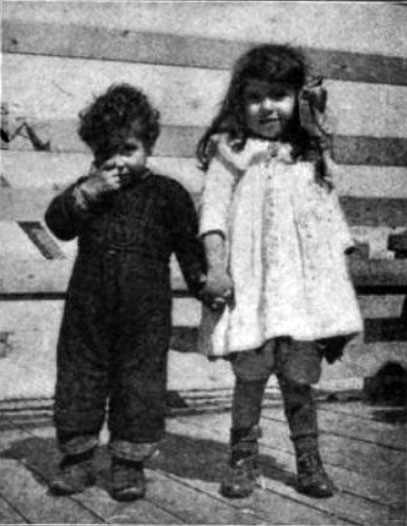
Photo 04 - Two Immigrant Children From Europe
" How do you mean for itself,' father ?" asked Sabrina.
ON PARADE
"The great West needs the foreign workmen. These hardy peasants from the east and south of Europe bring to this country the muscle and the nerve which makes such not understand what the development possible. The government is building roads, opening up canals, developing mines, digging ditches for irrigation.
There is no fear from immigration so long as the foreigner has worked with good wages, which this country can give him in exchange for his ambitious labor. Did your teacher tell you anything about naturalization? "
Sabrina shook her head.
" No, there was not time, I think."
" Probably most of the children in your school were born of naturalized parents, but very few of them know just what that means. Do you know what naturalization means, Sabrina? "
" I think it means that you can vote."
" Yes, but it means a good deal more than that, and you have to go through a complicated process before becoming a citizen of the country. Let me tell you what happened to me before I became a voter last year.
"First, two years ago, I filed at the police court a declaration of intention' to become a citizen of the United States. The clerk gave me a copy of it which would prove my right at the end of the two years to come up for naturalization if I should have been five years in the country by that time.
So last May, I went to the police court again, with two witnesses, your uncle and Mr. Garaskoski, both citizens, who swore before the- judge that I was a good man and not an anarchist. I made an oath that I believed in the Constitution of the United States, renouncing my allegiance to Russia.
Two RUSSIAN WOMEN
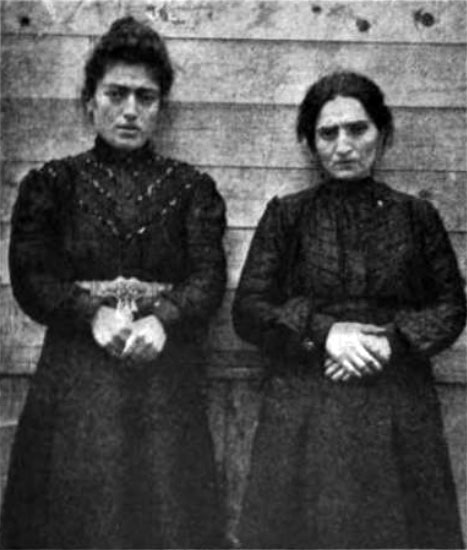
Photo 06 - Two Russian Women At Ellis Island
Then I received my naturalization papers drawn up by the clerk and sworn to by myself. Later I went to the city clerk and placed my name on a voting list, and last November, I cast my first vote in America?'
" Could you go back to Russia, father, without any trouble with the government ? " asked Sabrina.
"Why, yes. I am not an exile. I could go back to my country to visit friends. But it might be dangerous for me in Russia, although the government is supposed to respect American citizens and treat the United States with great respect and regard."
A moment later, Mr. Cohensky remarked: "I don't suppose you, Sabrina, will ever know what it is to live in a country with so little personal liberty as in Russia.
The opportunities you do not stop to value here are just the opportunities denied to me when I was a boy. Think of the things that you have as a bit of girl citizen, that we, your mother and I, never dreamed of in our childhood."
" Why I can remember some things myself," said Sabrina. " I have not forgotten what it was like in Moscow. No school, no playgrounds, no charity headquarters— I can remember that, father."
HIS FIRST PHOTOGRAPH
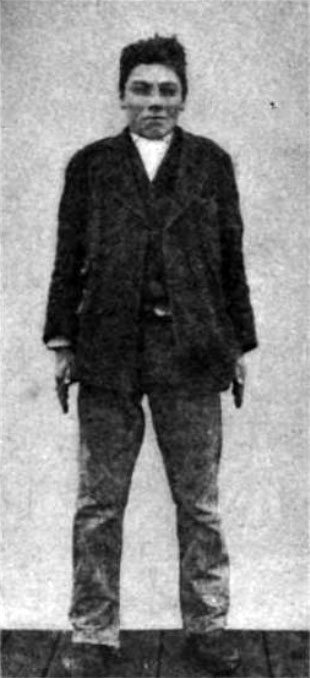
Photo 07 - An Immigrants First Photograph
" Ask your teacher tomorrow to let the children make a list of their rights and their parents' rights as citizens. It may interest them in taking the lists home and seeing how many of those privileges their parents did not have in their native land."
Sabrina did ask her teacher the next day to do that very thing, and Miss McEvoy carried out the idea most willingly, adding to the list of civil liberties enjoyed by citizenship in this country a list of particular advantages which the city child or the country child enjoys because of the advance in industries and art. So it was that a great deal of pleasant conversation came out of little Sabrina's argument over her rights as a citizen.
Why do people from other countries flock to the United States?
Do you know how many immigrants arrive in a week at Ellis Island in New York City, where the 'great majority of the immigrants land? Can an immigrant be turned back after his steamer reaches the United States?
What is a quarantine station?
Why is it so necessary to examine foreigners with such care?
A FOREIGNER
When he has finally passed the examination at Ellis Island, how can an immigrant find employment in a great city like New York?
Do you suppose that some immigrants are disappointed in the government of the United States after they have lived here for two or three years?
How soon can a foreign-born man become a voting citizen of the United States? What steps must he take to become naturalized and be given the franchise?
Are his children citizens after he has become naturalized?
AN IMMIGRANT UNDER INSPECTION
When he has become naturalized, what are his rights as a citizen? If you do not know, look for the Bill of Rights in your state constitution and the first ten amendments to the Constitution of the United States.
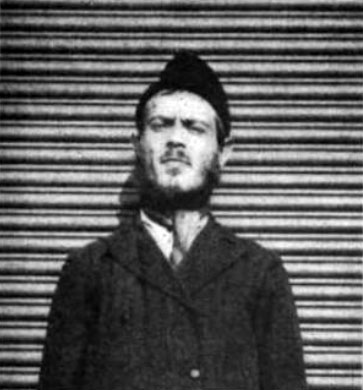
Photo 08 - One Of The Many Foreigners At Ellis Island
Name the different races of people in your town or city — Scotch, Irish, English, French, Jews, Armenians, Syrians, Russians, Italians, Germans, Swedes, Norwegians, etc.
Do the Japanese have the same naturalization privileges as the Germans or are they excluded in certain respects, as are the Chinese?
Do you think the country needs to protect itself by further exclusion?
The requirements for naturalization, as fixed by Congress, are as follows :
Five years' residence in the United States and one year's residence in the state where naturalization is sought.
Two years' preliminary declaration of an intention to become a citizen.
An oath to support the Constitution.
Renunciation of all foreign titles or orders of nobility.
Abjuration of allegiance to any foreign power.
No alien can be naturalized if his native government is, at the time, at war with the United States.
XIII. IMMIGRATION AND NATURALIZATION TOPIC FOR INVESTIGATION
- What were our relations to foreigners in the early period of our nationalization?
- What were the alien and sedition laws? and why were they not enforced?
- What of the coming of the Chinese, and the subsequent Chinese Exclusion Bill?
- What very recent steps have been taken in order to admit certain Chinese into the country?
- What restrictions have been made in late years concerning foreign immigration?
- Do authorities upon immigration believe that we should protect ourselves against further immigration?
- Are the foreign countries themselves suffering from depletion of population because of this steady increase in emigration?
VOCABULARY - IMMIGRATION
- alien
- foreign
- quarantine
- anarchist
- immigration
- exclusion
- health inspection
- naturalization
- emigration
- restriction
- allegiance
- declaration of intention
- Castle Garden
OFEICIAL TERMS AND DUTIES IMMIGRATION
Commissioner or Board of Commissioners: The official representatives of the United States who carry out the laws regulated by Congress in relation to immigration.
Agent: The active officer of the department who has care of the immigrants on the arrival of a ship in a port.
Inspectors: Officials in charge of the immigrants.
Quarantine Physician or Board of Health Agents: Medical inspectors who examine and pronounce upon contagious diseases.
NATURALIZATION
Judge of the Police Court or Municipal judge : This judge must have "common law jurisdiction." Before him the oath of allegiance is taken.
Clerk of the Court : The clerk makes record of the act of naturalization and grants certificates of naturalization.
The Witnesses : The friends who must testify to the man's term of residence and declare him to have been during the term a man of "good moral character," and a law-abiding person.
Lessons for Junior Citizens by Mabel Hill
Instructor in Socialized Civics and Economics in the Postgraduate Department, Dana Hall School, Wellesley, Massachusetts
With An Introduction by Albert Bushnell Hart, Professor of History In Harvard University
The Atbenmum Press, Ginn And Company, Boston • New York • Chicago • London • Atlanta • Dallas • Columbus • San Francisco
Copyright 1906 By Mabel Hill, All Rights Reserved

